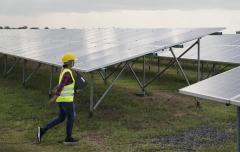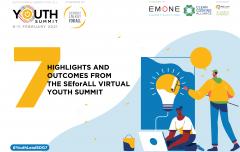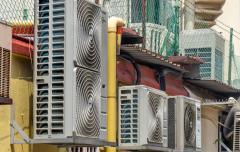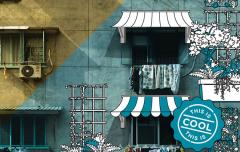International Youth Day: Young innovators bring cooling solutions to farmers in Nigeria
On 10 February 2021, Adekoyejo Kuye, Uzochukwu Mbamalu, Charles Aliozo and Chigozie Enemoh won the Troubleshooting for SDG7 innovation competition at the SEforALL Youth Summit.
The team works for Manamuz Electric LTD, a Nigerian renewable energy company that focuses on energy efficiency, solar energy applications and, more recently, providing energy access for smallholder farmers in underserved communities.
Before their entry into the Youth Summit competition, they had begun developing a solar-powered cold storage unit for local farmers to store their harvest to increase the shelf life of agricultural products, cutting down on food spoilage and allowing farmers to sell their produce to a wider network.
The judges at the Youth Summit were impressed by the Nigerian team’s idea, which promised to increase energy access and economic productivity. As a result, the team walked away with the USD 2,500 prize.
Six months later, just in time for International Youth Day 2021, which focuses on innovations for food systems, we caught up with Adekoyejo Kuye from the project team to see how their innovation is progressing, how winning the Troubleshooting for SDG7 competition has affected their work, and what the team has planned for the future.
We first learned about your innovation at the Youth Summit, but can you tell me about what the cold storage unit does?
It’s a walk-in commercial refrigeration solution that is completely powered by solar energy. The system is modular with an adjustable temperature range for different types of farm produce. Our pilot cold storage unit, which is currently deployed at a fruit and vegetable market, is powered by a 7.7 kilowatt off-grid solar system and with battery backup storage. The solution is meant for rural communities, farm clusters, and markets where there is no electricity grid to power refrigeration services or cold chains.
The good thing about this system is farmers don’t have to own these cold storage units, they only pay for cooling services used, which makes it very affordable and accessible. Also, the cold storage unit can be optimized to enable vaccine storage and distribution.
Photo credit: Olumide Idowu
Where did the idea come from?
At Manamuz, we all have an interest in using renewable energy for productive uses and improving economic activity in Nigeria. The country’s agricultural sector has huge potential, but this hasn’t been maximized because of energy access gaps. Last year we began thinking about how to use renewable energy to boost the sector’s productivity, so we began conceptualizing sustainable cold chains.
Most farmers live in rural communities and do not have access to electricity because the grid doesn’t reach them. They don’t have access to cold chains for storing the food they produce and they can only produce at a small scale. We wanted to create a low-cost, sustainable cold storage solution that would help these farmers grow their income without relying on fossil fuels for power.
What sort of impact can this unit have on local farmers?
We are providing these farmers with cooling as a service. For a small fee, they can store their products in the facility, which is located at a local market. Providing these cooling services and access to the market means food waste is reduced and farmers make more income. Farmers will be able to invest more in production and sell their harvested farm produce at the right market value, without fear that their product might go to waste due to lack of cooling.
At the time of the Youth Summit, you hadn’t quite launched the project in a community. Where does the project stand now?
Before the Youth Summit, we had already been working on product design and assembling the necessary components. But since then, we’ve moved to commercialization. At the beginning of July, we launched the pilot of our solution in a market in Ngwo community, Odegba, Enugu State, Nigeria. So far we’ve provided storage for over 6,000 kg of tomatoes and we currently have 151 farmers integrated into our cold chain network in just over a month of operations. These farmers serve an average of 2,000 customers weekly. These numbers are expected to grow significantly when we start replicating our solutions in different communities in the country.
How did winning the Youth Summit Troubleshooting for SDG7 competition affect your progress?
Winning the competition was really a morale boost for the team, especially in the middle of a global pandemic. It wasn’t just about the monetary aspect, which of course helped us optimize and deploy the pilot. What SEforALL did for us was give us a global platform to share our idea. After the Summit, we started receiving a lot of messages from people interested in the project. It’s also helped us connect with an international community of funders who can support us in scaling up.
Now that you’ve launched the pilot, what’s next? How do you want to build on this initial success?
We saw that not all smallholder farmers are able to pay for cooling as a service because not all of them have access to the market. Therefore, we began offering procurement as a service, where we connect these farmers to buyers and off-takers, and we get commissions from sales made. As part of this, we are developing our digital infrastructure so we can connect farmers to high-value markets, while also making the food supply chain more efficient and shorter. Right now, we are working on building a mobile app and website that can provide this digital infrastructure.
We are also in the planning stage of a higher-capacity cooling solution in another community in Nigeria that urgently needs access to sustainable cooling services. The current pilot project has been met with such high demand that we’ve realized that the next facility should be bigger, but of course still powered with solar.
About 50 percent of harvested agricultural produce in Sub-Saharan Africa never gets to the final consumer. We want to create resilient food systems in Africa through sustainable cold chains and digitization.
So many young people today are looking for a way to fight climate change and create a more sustainable future. What would your advice be to youth wanting to spark change?
I would tell them to think about the change they can make in their community. Energy access and climate change are global issues, but solving them starts with local action.





